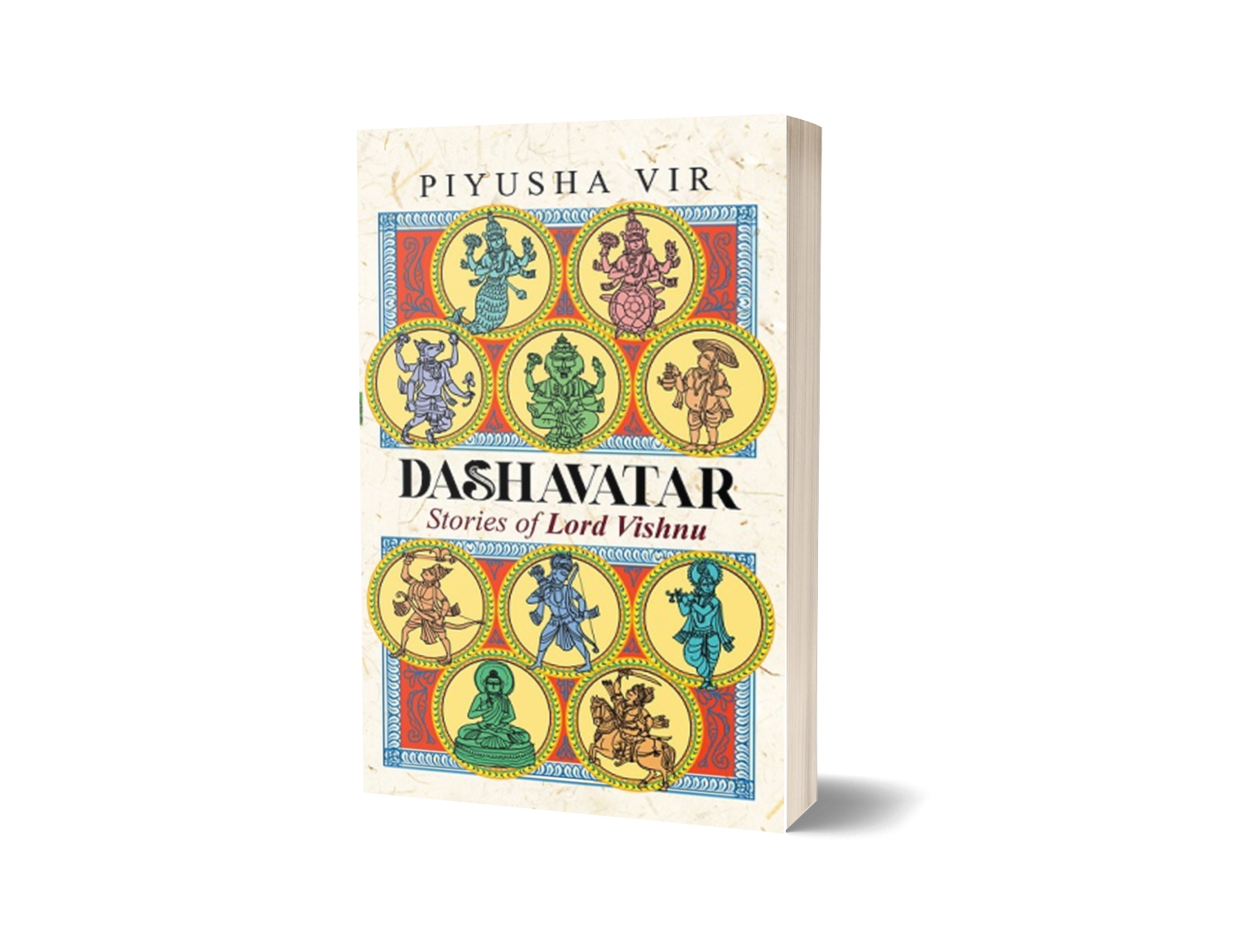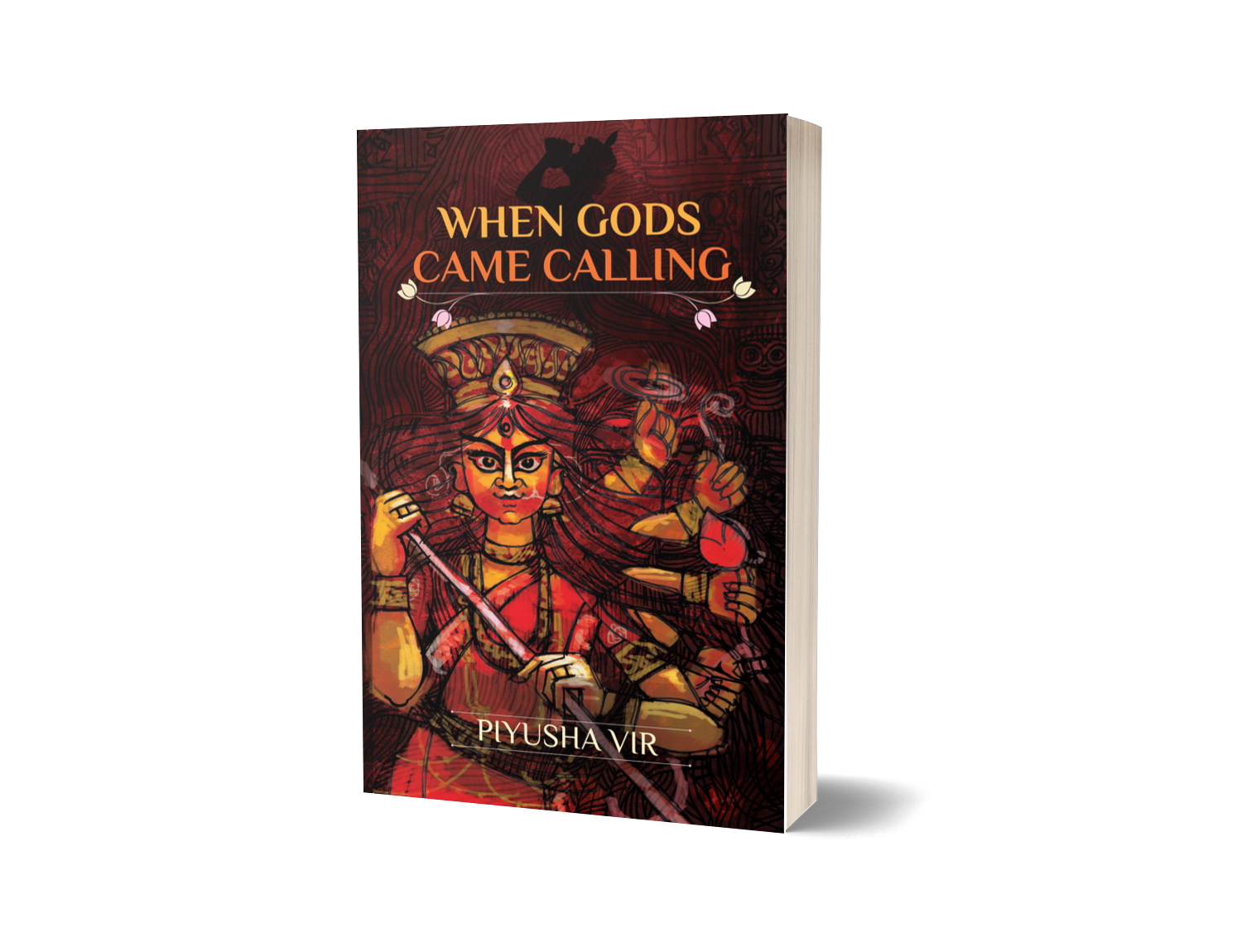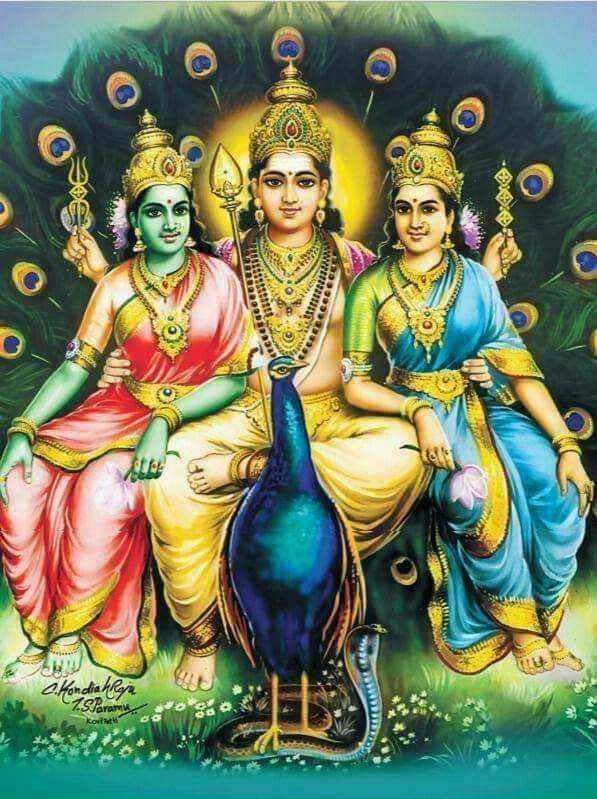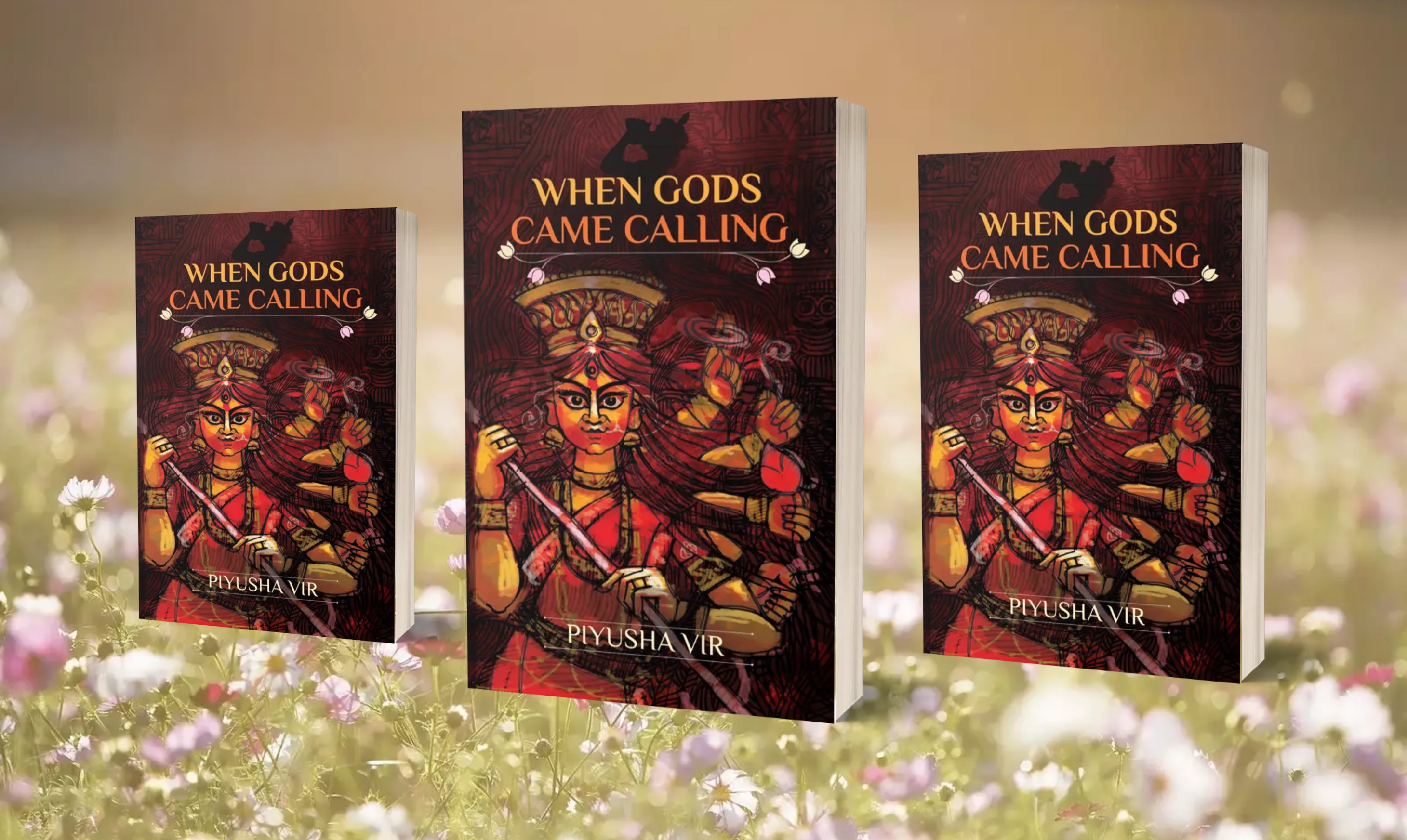Piyusha Vir is a writer, artist, a CELTA-certified English Language trainer, and a Creative Writing Coach. Her writings have been published on various platforms like Sheroes, LBB Delhi, Readomania, Momspresso and Womens Web. You can read more about her here.
Readomania: This is your second mythology book. Tell us, what draws you to this genre?
Piyusha: I am very much fascinated by Hindu mythology. Sometimes I find it frustrating, other times, I am taken aback by how profound and deep it is.
But one thing is for sure—it is an interesting mine of stories and learnings. The stories are timeless, of course, but apart from being entertaining, they also talk about social issues and causes like freedom of choice, voicing opinions, and being loving and empathetic.
I do believe that we’ve retained the stories but may have forgotten the lessons. It’s exactly what one character (played by Sunil Grover) says in the film Goodbye: ‘Science and logic is important. So, while it’s important to know the reasoning behind something, it is these stories that make these lessons memorable and easier to pass on from one generation to another.’
When I first began writing mythology, I started out with the aim of rewriting these stories to appeal to my rational, feminist side. Dashavatar: Stories of Lord Vishnu, was all about giving voice to underrepresented women. When Gods Came Calling is all about belief and hope, and how sometimes that belief that someone out there is looking out for you keeps you going. Each story in this collection is about how God shows up in some form or the other to protect the people.

Fiction has always been a powerful medium to talk ideas like love and inclusion. I feel fiction teaches us empathy, and respect. With the added element of mythology, which brings in a certain sense of piety, we begin to give more heed to these lessons that are the take-aways from these stories.
There are so many stories still untold and unexplored in our Hindu mythology. Then there’s the element of alternate perspectives that we’re only now beginning to touch upon through books like Mallar Chatterjee’s Yuddhisthir-The Unfallen Pandava or Shakuni & The Dice of Doom.
After Hindu mythology, I also want to read and explore Greek mythology.
Readomania: In When Gods Came Calling, you have chosen a lot of lesser known tales which make the book even more special. Don’t you agree?
Piyusha: I completely agree, and I am so glad you noticed that!
It was a conscious decision to bring forth stories that were not as popular or at least not at well known throughout the country. While we all know stories of the Ramayana and the Mahabharata, stories of gods like Ayappa are not well-known in Northern regions of the country.
I was particularly looking for stories that I wasn’t familiar with. My biggest challenge was whether the readers would also be unfamiliar with these stories. I doubt that! However, I have tried bringing some element of newness through making these stories more believable, rational, and relevant.
For example, we obviously know there is no tangible entity called ‘God’. When we hear a voice inside us, it is merely our inner conscience speaking, and telling us what is right or wrong. It is this aspect that I explored in one of the stories. In the story about Goddess Saraswati, I was aghast reading about Lord Brahma’s behaviour, and there was no way I could ignore that or not include the story in this collection. I knew it wasn’t a story that was commonly narrated.

Source: https://hindupad.com/brahma-saraswati-kalyanam/
As I understood it, for me Saraswati’s actions represented the small and insignificant battles that a lot of the women fight in their every day lives. Every single day, they navigate, negotiate, compromise, adjust within the confines of patriarchal control that society and family impose upon them.
Similarly, the story of Lord Hanuman is about how women (mothers, wives, daughters who are in caretaking roles) prioritize other people in our lives without realizing that we ourselves are just as important. Women are trained and conditioned to sacrifice for their families but it is high time women understood their own worth too.
There are many such stories that will hopefully bring forth these lesser explored perspectives for the readers.

Readomania: The issues and emotions faced by the deities in the stories make them seem human even. Was that your intention?
Piyusha: If you were to ask me if I believe in God, I’d say ‘yes’. If you were to ask me again, if I were a religious person, I’d say ‘no’. While I do question the existence of a tangible ‘God’ and I don’t endorse idol worship, I truly subscribe to the age-old belief that God resides in everything and everyone around us. The deities are fictional characters written by humans so they will most certainly carry human traits, virtues, and vices. I believe these stories were written to help impart a moral code of conduct—whether right or wrong is another debate, that was acceptable to society at that time. So, we have stories like Valli and Devayanai that represent two different ways to reach a higher spiritual existence, and yet there’s a strong undercurrent of derision and casteism within those stories which give away the caste-based discrimination that unfortunately exists even today.

https://sharechat.com/
Readomania: Writing on Gods is never easy. One has to be extra careful so as not to hurt religious sentiments. What were the challenges that you faced while penning the book?
Piyusha: This was a major challenge I faced. I firmly believe Man created God, and not the other way round.
For me, things like Language, Religion, God, Food, are truly above disrespect. These things are so huge as concepts and so intrinsic a part of every day life, that one cannot disrespect them even if one tried. Also, while my idea of God and Worship is quite different—I believe my God is extremely forgiving and compassionate. He doesn’t mind me eating non-veg on Tuesdays or not visiting the temple but he does care about me treating others around me with respect and dignity. I was mindful of the fact that for each individual, the idea of God is personal.
When we say that ‘our religious sentiments were hurt’, what we’re really saying is that we take offence that you don’t view our Gods the same way as we do. I feel that’s a very egotistical way of looking at things. If I care about a particular God, that doesn’t mean someone else should too. Having said that, I also do believe in self-censorship. I wouldn’t want to write stories that hurt people based on their own religious beliefs. The idea is not to question why someone believes in particular God but to help them understand their God better. For me, even though I was writing fictional stories about fictional entities, the idea was to entertain not preach. So, even while I personally disagree with some of the things mentioned in the stories, I retained those elements for the sake of staying true to the commonly known narratives.
The only way I could have done this is if I truly believed and respected these Gods, the way others who believed in them would do. Then it was easy enough writing these stories.
There was another fear I had—since I am myself from a position of privilege, I was very scared of speaking over or mis-representing the under-represented communities in these stories. It would affect me deeply if I wrote something that was disrespectful to the under-represented and marginalised communities, or their beliefs and ideas. I truly hope I haven’t done that.
I also believe my readers are discerning enough to understand the difference between challenging age-old beliefs and being disrespectful. I trust every reader will exercise their own judgement in how they evaluate these stories.
Readomania: Every mythological story has multiple variations and sources. How did you choose which version to narrate and how did you add your own spin to them?
Piyusha: The many variations and alternate versions of the stories that exist in mythology is something I had discovered while writing Dashavatar: Stories of Lord Vishnu only. That is also one of the reasons why mythology is so vast and fascinating. Because these stories were first communicated orally, the first level of dilution must have happened years ago. Who really knows what’s the authentic version, and if it even exists today?
While the versions may vary slightly in minor details or in how the stories end, the main plot remains similar in all versions. Whenever I found some details different, I went with the one that most appealed to me with regards to the story line and the believability factor.
I had a major crisis of confidence while writing these stories because there was so much that I disagreed with, or was offended by. I had even completely given up on this book. The only thing that brought me back to it was the thought that if I don’t write these stories the way I want to, no one else will. So, while I was offended by how casteist and discriminatory these stories were, I also realized that it was upon me to write these stories as best as I could without sanitizing them but also at the same time bringing out the good parts. It was a tough balance between calling out the bad without bringing in the savarna saviour complex but also highlighting the good.
I believe the burden of being inclusive shouldn’t fall on the marginalized. As a privileged, cis-het women with mixed lineage (including Brahmin ancestors), it was my responsibility to make these stories as inclusive as possible. Since the basic plot structure was already in place, there was no need to alter or reimagine that. The complexity of the good and the negative is what I wanted to bring out in and in highlighting that is where I’ve added my own spin to these stories.
I’ve made those good or negative aspects in the story more prominent through the dialogues I believed were relevant, in events that I felt would have occurred, while also empowering women and underprivileged voices more. In these stories, you’ll come across people speaking out against injustices, questioning the powerful, challenging the status quo—whether it be a minister who refuses to carry out the king’s orders, or a minor character who dares to stand up to a powerful God.
Readomania: Each story is followed by some facts that make the reading experience exponentially higher. What was the intention behind this?
Piyusha: I felt that narrating these stories on their own without context would defeat the purpose of why we read and listen to mythological stories. These stories are so complex and layered with so many different connotations and interpretations, that if one was to ignore the bigger picture, it would lead to only a partial understanding of what happens in the story. Often, the events in these myths are connected to present-day locations like towns and temples. It was important for me to bring out that association and help make the stories more relatable and connected to the world we live in today.
Readomania: Do you think reading mythological stories makes us understand our culture better?
Piyusha: This is a very long and complicated response. Bear with me, please, because there’s no easy answer here.
I do feel that it helps us understand our culture, our values, and even our present better. The one reason why these stories fascinate me so much is because there’s so much to learn from in these stories. From the take-aways from many of these stories, we make our present and future better.
Our culture includes literature like Kama Sutra, stories of Shiva and Parvati as ‘Ardh-Nareshwar’, and sculptures and figurines of people engaging in homosexual relationships. It is sad that today we’re debating about whether or not same-sex couples should be allowed to marry. It is sad that we expect women to be tied to domestic roles only, and that a family unit consists of a cis-het man and a cis-het woman, that too only when the two people have been approved and allowed to be together as per by society’s patriarchal and casteist standards.
Come to think of it—India is one of the highest consumers of porn (Again, Kama Sutra, anyone?), and yet, we refuse to impart proper sex education to our children. We refuse to openly talk about sexual wellness and consent. We refuse to equip our children with knowledge, empathy, acceptance, and compassion for the LGBTQIA community. Even today, we turn the other way when it comes to discussing basic rights for the Transgender community. We’re happy doling out alms to them but refuse to even speak to them with dignity.
Isn’t all this a bit hypocritical that in a culture where the Gods themselves are transgender, we look down upon the queer community?
It’s not just about the LGBTQIA community. Even when we talk about gender equality and feminism, the word gets so much hatred for no reason.
During the pandemic, we saw a rise in domestic violence against women, invisible labour, mental load, and depression among women. Women are treated and revered as goddesses on one night but raped the next day. Marital rape is still not a crime!
Women are often labelled and celebrated as ‘Superwomen’ because they manage to run the house so efficiently but we refuse to break down the patriarchal structures that restrict women from working, achieving their own dreams, and ambitions.
From bigger struggles like women fighting for equal pay to shared domestic responsibilities, to every day struggles like stepping out in to the world without fear, we’re constantly fighting. And yet, the misogynists manage to blame feminism even though they know it’s patriarchy to blame.
From every day slights like if a man knows how to cook, his wife is told how lucky she is, but, if a woman doesn’t know how to cook; to being trolled online for merely having a voice, or even daring to reject a man’s proposal, she is subjected to all sorts of ridicule and abuse.
Let’s go deeper and talk about women’s participation in the workforce.
The participation of women in the Indian workforce is at an abysmal 19%. Even today, we do not consider unpaid domestic labour as ‘work’. Pick up any traditional artform of India—that’s part of our culture, right?—and you will see images of women working in fields, just like the men. How then did we decide that women should not be allowed to step out or work?
Urban educated women expect paid leaves for themselves. We fight for maternity leaves, period policy, right to abort, but refuse to extend the same benefits to our own domestic help. I have heard so many stories where domestic workers have been reprimanded for taking leaves due to ill-health. Our culture accords so much respect on motherhood and domestic duties. Then why do we not respect the staff that cooks and cleans for us, taking away half the domestic responsibilities, in the process enabling us to the show up for our ‘elite’ well-paying MNC jobs.
Some of these stories have very strong casteist undertones, and if you read carefully, the discrimination is evident. Why do we selectively choose to adopt only those practices that keep power structures intact, but refuse to extend basic dignity to every individual?
Erasure of women through history and culture is evident. Even with Kama Sutra, for example, the many translations have only erased women’s agency and sexual independence in order to make the text more palatable. Of course, a lot of the blame goes to the British, but how is the Manusmriti any better? It is one of the most offensive pieces of literature that is regrettably a part of our Hindu culture. And the degradation of women that Manu had endorsed in his writing continues even today.
If we want to stop the gender, religious, and caste-discrimination, we first need to connect with who we were, accept and acknowledge the hurt and damage that has been caused in the name of culture, and then work towards righting those wrongs. The first step to that would be dismantle the traditional power structures.
So yes, I feel knowing our culture is important but even more important is to understand what’s worth following and what needs to be called out.
I have tried doing just that through this book, without being preachy. I do believe that there is hope—that if we were to truly understand and call out the discrimination that is inherent in these stories, we’d become a much better people.
Readomania: Were you an avid reader of mythology as a child and teenager?
Piyusha: These stories are such an intricate part of our culture that I feel every kid knows these stories without really being formally introduced to them. We know of certain incidents like killing of Kamsa or overpowering Kaliya serpent because we’ve been introduced to these stories from a young age. Often, when young kids play Krishna during Janmashtami, they learn of these individual stories, but they may not know everything about Krishna’s life. So, while I was familiar with some of these stories, I don’t remember actually reading or hearing these stories.
My first introduction to mythology was during Doordarshan’s Sunday telecast of Mahabharat, but I never really understood these stories then. While I watched Mahabharat with my entire family, Ramayana somehow never held my interest then. I view these stories very differently now. A few years ago, my interest in mythology was rekindled thanks to a friend who recommended a book she had read and loved. I loved reading the story, which was narrated from the POV of a lesser-known character, and the book got me hooked to this genre again.
Readomania: What is that one mythological story that has inspired you the most and why?
Piyusha: The Liberation of Sita, authored by a Telugu poet and writer, Volga is one of my all-time favourite reads. It was recommended to me by Sandhya Renukamba, Community Editor at Women’s Web—the feminist platform I love so much, and where I also work now.
Volga’s book is easily the best, most empowering feminist reimagination of Sita’s story (after Rama disowns her as his wife and queen of Ayodhya) I have read.
I wish to some day be able to write stories like this one, where I am not just retelling the stories from an intersectional feminist lens, but, in fact, completely reimagining them from an alternate perspective. I have a long way to go before I can do that, but these stories inspire and motivate me towards that goal.
Readomania: Thank you Piyusha, for this wonderful conversation.
Her latest book, When Gods Came Calling is available on Amazon and Readomania


Comments